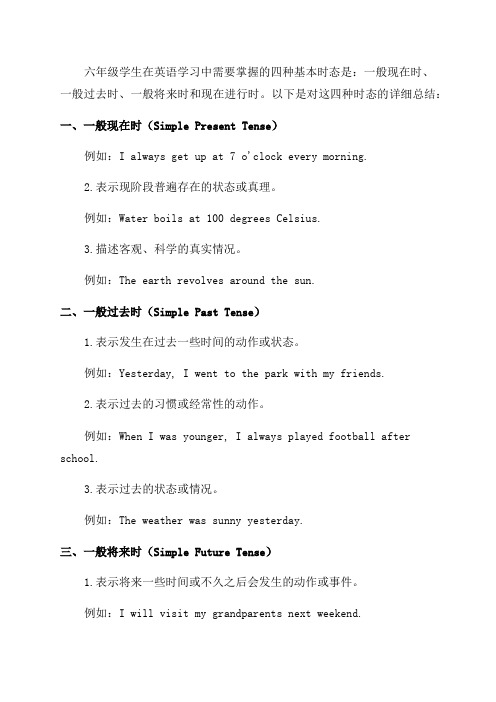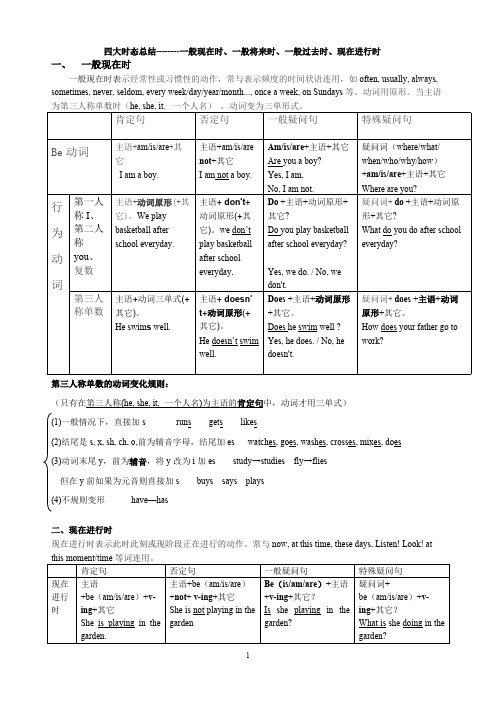六年级上册一般现在时一般将来时(新版)
六年级四种时态总结

六年级学生在英语学习中需要掌握的四种基本时态是:一般现在时、一般过去时、一般将来时和现在进行时。
以下是对这四种时态的详细总结:一、一般现在时(Simple Present Tense)例如:I always get up at 7 o'clock every morning.2.表示现阶段普遍存在的状态或真理。
例如:Water boils at 100 degrees Celsius.3.描述客观、科学的真实情况。
例如:The earth revolves around the sun.二、一般过去时(Simple Past Tense)1.表示发生在过去一些时间的动作或状态。
例如:Yesterday, I went to the park with my friends.2.表示过去的习惯或经常性的动作。
例如:When I was younger, I always played football after school.3.表示过去的状态或情况。
例如:The weather was sunny yesterday.三、一般将来时(Simple Future Tense)1.表示将来一些时间或不久之后会发生的动作或事件。
例如:I will visit my grandparents next weekend.2.表示打算、计划或意图。
例如:I am going to study hard for the exam.3.表示预测、预言或非即刻发生的事情。
例如:It will rain tomorrow.四、现在进行时(Present Continuous Tense)1.表示现在正在进行的动作或状态。
例如:I am studying English now.2.表示临时的、目前的事情。
例如:She is staying at her friend's house this week.3.表示将来已确定的计划或安排。
六年级上一般现在时、现在进行时、一般将来时、一般过去时讲解及专项练习

六年级上一般现在时、现在进行时、一般将来时、一般过去时讲解及专项练习work Information Technology Company.2020YEAR六年级上一般现在时、现在进行时、一般将来时、专项练习Class:_________ Name:_________ No:_________小学英语3种时态复习一、用动词的正确形式填空1. I ________________ (do) my homework every evening.2. We _________________ (fly) kites in the park next Sundays.3. Tom ___________(play) the piano every Saturday. Now he________ (play).4. She _______(like) swimming. She ___________ (swim) this weekend.5. Usually my mother _______ (wash) the dishes after lunch. But my grandma____________ (wash) now.6. Look at the man! He ___________ (read) a magazine.7. Look! The plane ______________ (fly) over the building.8. Listen! My aunt ____________ (sing) in the room.She is a singer. She _____ (like) singing. She _______(have) a music show. She is excited.9. Tom and Mike always ______ (swim) in the river. They _____ (swim) in the swimming pool this Sunday. Look! They ______ (swim).10. What ______ you usually ______ (do) in the evening?I _______ (play) computer games.11. What _______ you _______ (do) now?I _______ (make) a paper plane.12. What _______ he _______ (do) nowHe ______ (dance).13. ______ your mother ______ (read) newspaper in the morning?Yes, She ________ .16. _______ you _______ (like) fishing?No, I ______ . I like ______ (swim),but my brother ______ (like).17. How ______ your father _______ (go) to work every day?He ______ (go) by bike. But it’s cold today. He ______ (take) the No.21 bus,18. _______ the monkey _______ (like) climbing trees Yes, it _______ .19. What _______ your father ______ (do) after lunch He _______ (read) acomic book.20. ________ you ______ (collect) stamps Yes. I _______ .________ your brother ______ (collect), too No, he ________ .二、选择题1. _____ he _____ to the park at 6:30 in the morning No,he _____ .A. Does; goes; doesB. Does; go; doesn’tC. Does; go; does2. Tim always _____ a picture at home. He _____ a car now.A. draws; is drawingB. draw; drawC. draws; draw3. She usually _____ her friends. They often _____ tea.A. see; drinkB. sees; drinksC. sees; drink4. He usually _____ the dishes at night, but tonight he _____ clothes.A. wash; washB. washes; is going to washC. is washing; washes5. Mr. Green usually _____ his newspaper in the evening, but he and his wife _____ television this evening.A. reads; watchesB. reads; are going to watchC. reads; watch6.Where are the man and the womanThey _____ near the tree.A. sitB. sitsC. are sitting7. _____ your father _____ divingNo, he _____ .He ______ writing stories.A.Does; like; doesn’t; likesB.Does; likes; doesn’t; likeC.Do; like; don’t; likes8. Mr. Green often _____ his newspapers at night. But he _____ an interestingbook tonight.A. reads; readsB. reads; readC. reads; is going to read9. The old man _____ playing sports in the park. He _____ morning exercise now.A. likes; is doingB. likes; doesC. like; doing10. Where ______ the boy _____He _____ across the river now.A. does; swim; swimsB. is; swimming; is swimmingC. is, swim, is swimming11. _____ you _____ to music nowYes, we _____ .A. Do; listen; doB. Did; listen; didC. Are; listening; are12. Look! Two cats ______ across the wall.A. runB. runsC. are running13. She _____ tea, but he _____ .A. likes; doesn’t B; like; don’t C. like; doesn’t一般过去时一般过去时的构成:一般过去时是用动词的过去式来表示。
小学六年级英语语法四大时态句式转换

四大时态复习1. 一般现在时1一般现在时的构成肯定句☆be动词:主语+beam,is,are+其它;如:I am a boy.我是一个男孩;☆行为动词:主语+行为动词+其它;如:We study English.我们学习英语;☆当主语为第三人称单数he, she,it时,要在动词后加"-s"或"-es";如:Mary likes Chinese. 玛丽喜欢汉语;2一般现在时的变化☆. be动词的变化;否定句:主语+ be + not +其它;如:He is not a worker.他不是工人;一般疑问句:Be +主语+其它; 如:-Are you a student -Yes. I am. / No, I'm not.特殊疑问句:疑问词+一般疑问句;如:Where is my bike☆.行为动词的变化;否定句:主语+ don't doesn't +动词原形+其它;如:I don't like bread.当主语为第三人称单数时,要用doesn't构成否定句;如:He doesn't often play.一般疑问句:Do Does +主语+动词原形+其它;如:- Do you often play football- Yes, I do. / No, I don't.当主语为第三人称单数时,要用does构成一般疑问句;如:- Does she go to work by bike - Yes, she does. / No, she doesn't.特殊疑问句:疑问词+一般疑问句;如:How does your father go to work 动词+s的变化规则1.一般情况下,直接加-s,如:cook-cooks, milk-milks2.以s. x. sh. ch. o结尾,加-es,如:guess-guesses, wash-washes, watch-watches, go-goes 3.以“辅音字母+y”结尾,变y为i, 再加-es,如:study-studies2.现在进行时(1)一般现在时的构成:beam,is, are+ 动词的ing形式;如:I am reading. 我正在读书(2)现在进行时的否定句在be后加not,即beam,is, are + not + 动词的ing形式;如:She is not doing her homework now. 她现在没有做作业;(3)现在进行时的一般疑问句把be动词调到句首,即Beam,is, are + 人+ 动词ing形式;如:Are you drinking milk now 你现在在喝牛奶吗(4)现在进行时的特殊疑问的基本结构为:疑问词+ be + 人+ 动词ing如:Where are you going 你现在去哪但who当主语时其结构为:Who + be + 动词ing如:Who is talking to you 谁在和你说话动词加ing的变化规则1.一般情况下,直接加ing,如:cook-cooking2.以不发音的e结尾,去e加ing,如:make-making, taste-tasting3.如果末尾是一个元音字母和一个辅音字母,双写末尾的辅音字母,再加ing,如:run-running, stop-stopping3.一般将来时1一般将来时基本结构:①be going to + do动词原形;②will+ do动词原形.2否定句:在be动词am, is, are后加not或情态动词will后加not成won’t;结构为:beam, is, are + not + 动词原形will not + 动词原形will not = won’t例如:①I’m going to have a picnic this afternoon.→I’m not going to have a picnic this afternoon.②I will go shopping this weekend.→I will not go shopping this weekend.= I won’t go shopping this weekend.3一般疑问句:be或will提到句首,some改为any, and改为or,第一二人称互换;例如:①We are going to go on an outing this weekend.→Are you going to go on an outing this weekend②I will play football tomorrow afternoon.→Will you play football tomorrow afternoon4特殊疑问句①问人用Who例如:I’m going to New York soon. →Who’s going to New York soon.②问干什么用What …do.例如:My father is going to watch a race with me this afternoon.→What is your father going to do with you this afternoon.③问什么时候用When.例如:She’s going to go to bed at nine. →When is she going to bed4.一般过去时1.肯定句be动词在一般过去时中的变化:☆am 和is在一般过去时中变为was;was not=wasn’t☆are在一般过去时中变为were;were not=weren’t行为动词在一般过去时的句子中要变成过去式一般是在句子后面加ed(2)否定句:be动词变成was notwasn’t 或were not weren’t如:He wasn’t a teacher two years ago.didn’t +动词原形如:Jim didn’t go home yesterday.(3)一般疑问句有be动词的一般疑问句把was或were调到句首;如:Were you a teacher two years ago句中没有be动词的一般过去时的句子,在句首加did,句子中的动词过去式变回原形;如:Did Jim go home yesterday4特殊疑问句:①疑问词+did+主语+动词原形如:What did Jim do yesterday②疑问词是who时:疑问词+动词过去式如:Who went to home yesterday动词过去式变化规则:☆.一般在动词末尾加-ed,如:pull-pulled, cook-cooked☆.结尾是e加d,如:taste-tasted☆.末尾只有一个元音字母和一个辅音字母的重读闭音节,应双写末尾的辅音字母, 再加-ed,如:stop-stopped☆.以“辅音字母+y”结尾的,变y为i, 再加-ed,如:study-studied☆.不规则动词过去式:am,is-was, are-were, do-did, see-saw, say-said, give-gave, get-got, go-went, come-came, have-had, eat-ate, take-took,run-ran, sing-sang, put-put, make-made, read-read, write-wrote, draw-drew, drink-drank, fly-flew, ride-rode,speak-spoke, sweep-swept, swim-swam, sit-sat随堂练习一、写出下列动词的第三人称单数drink ________ go _______ stay ________ make ________ look _________ have_______ pass_______ carry ____ come________ watch______ plant_______ fly ________study_______ brush________ do_________ teach_______二、按照要求改写句子1. Daniel watches TV every evening.改为否定句___________________________________________________2. I do my homework every day.改为一般疑问句,作否定回答________________________________________________________3. She likes milk.改为一般疑问句,作肯定回答___________________________4. I like taking photos in the park.对划线部分提问________________________________________________________5. John comes from Canada.对划线部分提问___________________________________________________三.写出下列动词的现在分词:play________ run__________ swim _________make__________ go_________ like________ write________ _ski___________ read________ have_________ sing ________ dance_________ put_________ see________ buy _________ love____________ live_______ take_________ come ________ get_________ stop_________ sit ________ begin________ shop___________四、句型转换:1. They are doing housework .改成否定句_____________________________________________________________2.The students are cleaning the classroom . 改一般疑问句并作肯定和否定回答__________________________________________________________________________________________________________________________________3.I’m playing the football in the playground .对划线部分进行提问_________________________________________________________________4.Tom is reading books in his study . 对划线部分进行提问_________________________________________________________________五.填空;1. 我打算明天和朋友去野炊;I_____ _______ _________ have a picnic with my friends.I ________ have a picnic with my friends.2. 下个星期一你打算去干嘛我想去打篮球;What ________ ________ _________ _________ _________ next Monday I _______ ______ _____ play basketball.What _________ you do next Monday I ________ play basketball.3. 你妈妈这个周末去购物吗是,她要去买一些水果;_____ your mother _______ ________ go shopping this ___________ Yes, she _________.She ______ ________ __________ buy some fruit.4. 你们打算什么时候见面;What time _______ you _________ __________ meet5. Nancy is going to go camping.改否定Nancy ________ going to go camping.6. I’ll go and join them.改否定I _______ go ______ join them.7. I’m going to get up at 6:30 tomorrow.改一般疑问句________ _______ ________ to get up at 6:30 tomorrow8. We will meet at the bus stop at 10:30.改一般疑问句_______ ________ meet at the bus stop at 10:30.9. She is going to listen to music after school.对划线部分提问________ _______ she ________ ________ _________ after school10. My father and mother are going to see a play the day after tomorrow.对划线部分提问_________ _________ going to see a play the day after tomorrow.七.写出下列动词的过去式fly_______ plant________ are ________ drink_________ play_______ go________make ________ does_________ dance________ worry________ ask _____ taste_________ eat__________ draw________ put ______ throw________ kick_________ pass_______do ________八、句型转换1. It was exciting.否定句:________________________________________________一般疑问句:____________________________________________肯、否定回答:__________________________________________2. All the students were very excited.否定句:________________________________________________一般疑问句:____________________________________________肯、否定回答:__________________________________________3. They were in his pocket.否定句:________________________________________________一般疑问句:____________________________________________肯、否定回答:__________________________________________4. Su Hai took some photos at the Sports day.否定句:________________________________________________一般疑问句:____________________________________________肯、否定回答:__________________________________________5. Nancy went to school early.否定句:________________________________________________一般疑问句:____________________________________________肯、否定回答:__________________________________________6. We sang some English songs.否定句:________________________________________________一般疑问句:____________________________________________肯、否定回答:__________________________________________。
(完整版)一般现在时、一般过去时、一般将来时、现在进行时

初中语法一般现在时、一般过去时、一般将来时、现在进行时四种时态的区别名称定义时间动词形式时间词always、sometimes、usually、1、动词原形often、every表示经常性或习2、第三人称单一般现在时平时、经常惯性的动作数morning、动词后-s/esevery week、twice a week等等now、rightnow、表示此时此刻或at theam/is/are+动词现在进行时现阶段正在进行正在进行ingmoment、的动作look、listen等in the future、1、will/shall+动next词原形表示将来发生的week/month、一般将来时即将、计划2、am/is/are事tomorrow、+going to+动词in two weeks原形等等ago、yesterday、表示过去某一时1、V-ed(规则last week/候或某一段时间过去(与现动词)一般过去时night、所发生的事情或在无关的)2、不规则动词just now、存在的状态变化once upon atime等注意:1、一般现在时——第三人称单数的动词变化规则:1)大多数动词在词尾加“S”如:stop-______; make-______read-______; play-______2)以辅音字母加“y”结尾的,要先将“y”变为“i”,然后在加“es”如:fly-______;carry-______study-______; worry-______3)以“s, x, ch, sh”结尾的,在词尾加“es”如:teach-______;watch-______4)以“o”结尾的动词,加“es”如:go-______do-______2、现在进行时——动词ing形式的变化规则1.一般动词直接在词尾+ing例:read→______(读)talk→______(交谈)sing→______(唱歌)2.以不发音e结尾的动词,先去e再加ing例:like→______喜欢write→______写skate→______(滑冰)3.以重读闭音节结尾且末尾只有一个辅音字母的动词,双写末尾字母,再加ing例:stop→______(停止)get→______(得到)4.少数几个以ie结尾的动词,变ie为f再加ing。
英语人教版六年级知识点

英语人教版六年级知识点一、动词的时态动词的时态是英语中非常重要的知识点。
在人教版六年级英语教材中,学生需要掌握以下几个时态:一般现在时、一般过去时、一般将来时以及现在进行时。
这些时态的用法和构成都有一定的规律性。
1. 一般现在时一般现在时表示经常性的动作、习惯或客观事实。
它的构成规则为:主语加动词原形。
例如:I eat an apple every day.(我每天吃一个苹果)2. 一般过去时一般过去时表示过去发生的事情和不再存在的状态。
它通常由动词的过去式构成。
例如:He played basketball yesterday.(他昨天打篮球)3. 一般将来时一般将来时表示将来要发生的动作或存在的状态。
它的构成规则为:主语加将/将来要+动词原形。
例如:I will go to the park tomorrow.(明天我将去公园)4. 现在进行时现在进行时表示现在正在进行的动作。
它的构成规则为:主语加be动词的现在分词。
例如:They are playing football now.(他们现在正在踢足球)二、名词的单复数名词的单数和复数形式也是六年级英语教材中需要掌握的重要知识点。
常见的名词复数形式有以下几种:1. 以-s结尾的名词,直接在词尾加-s。
例如:cats(猫)、books(书)2. 以-s、-ch、-sh、-x和-o结尾的名词,在词尾加-es。
例如:buses(公共汽车)、boxes(盒子)3. 以辅音字母+y结尾的名词,先将y变为i,再加-es。
例如:butterflies(蝴蝶)4. 以-f或-fe结尾的名词,一般将f或fe变为v,再加-es。
例如:leaves(叶子)、lives(生活)5. 不规则复数形式。
有许多名词的复数形式是不按规则变化的,需要直接记忆。
例如:children(孩子们)、tooth(牙齿)三、形容词的比较级和最高级学习形容词的比较级和最高级也是人教版六年级英语教材中的重点内容。
(完整版)一般现在时、现在进行时、一般将来时、一般过去时四大时态讲解表格对比总结

四大时态总结--------一般现在时、一般将来时、一般过去时、现在进行时一、一般现在时一般现在时表示经常性或习惯性的动作,常与表示频度的时间状语连用,如often, usually, always, sometimes, never, seldom, every week/day/year/month..., once a week, on Sundays等。
动词用原形。
当主语为第三人称单数时(he, she, it, 一个人名),动词变为三单形式。
肯定句否定句一般疑问句特殊疑问句Be动词主语+am/is/are+其它I am a boy.主语+am/is/arenot+其它I am not a boy.Am/is/are+主语+其它Are you a boy?Yes, I am.No, I am not.疑问词(where/what/when/who/why/how)+am/is/are+主语+其它Where are you?第一人称I、第二人称you、复数主语+动词原形(+其它)。
We playbasketball afterschool everyday.主语+ don't+动词原形(+其它)。
we don’tplay basketballafter schooleveryday.Do +主语+动词原形+其它?Do you play basketballafter school everyday?Yes, we do. / No, wedon't.疑问词+do +主语+动词原形+其它?What do you do after schooleveryday?行为动词第三人称单数主语+动词三单式(+其它)。
He swim s well.主语+ doesn’t+动词原形(+其它)。
He doesn’t swimwell.Does +主语+动词原形+其它。
Does he swim well ?Yes, he does. / No, hedoesn't.疑问词+ does +主语+动词原形+其它。
新人教(PEP)六年级英语上册语法一般现在时

新人教(PEP)六年级英语上册语法一般现在时Hello, boys and girls.我是一般现在时,你们想知道我的故事吗?Let me tell you!首先,介绍我的本领。
我的本领有三样:1.表示事物或人物的特征、状态。
如:The sky is blue.天空是蓝色的。
2.表示经常性或习惯性的动作。
如:I get up at six every day.我每天六点起床。
3.表示客观现实。
如:The earth goes around the sun.地球绕着太阳转。
第二,请看我的面目构成:1.be动词:主语+be(am,is,are)+其它。
如:I am a boy.我是一个男孩。
2.行为动词:主语+行为动词(+其它)。
如:We study English.我们学习英语。
当主语为第三人称单数(he, she, it)时,要在动词后加“-s”或“-es”。
如:Mary likes Chinese.玛丽喜欢汉语。
第三,我的变化——否定句、一般疑问句、特殊疑问句:1.be动词的变化。
否定句:主语+ be + not +其它。
如:He is not a worker.他不是工人。
一般疑问句:Be +主语+其它?如:—Are you a student?—Yes. I am. / No, I’m not.特殊疑问句:疑问词+一般疑问句?如:Where is my book?2.行为动词的变化。
否定句:主语+ don’t( doesn’t ) +动词原形+其它。
如:I don’t like milk.当主语为第三人称单数时,要用doesn’t构成否定句。
如:He doesn’t often play football.一般疑问句:Do( Does ) +主语+动词原形+其它?如:—Do yo u often play the piano?—Yes, I do. / No, I don’t.当主语为第三人称单数时,要用does构成一般疑问句。
六年级上册一般现在时一般将来时(新版)

复习重点:一般现在时&一般将来时Name: ________________Class: ________________一般将来时一、一般将来时表示还没发生的事情,即打算,准备去做的事情(未做)时间标志:tomorrow, tonight(今晚) next(下一个)…this…构成:"be (is, am, are) going to +动词原形/"表示即将发生的或打算最近要做的事情,主要用于口语。
例如:I am going to see a film this afternoon. 我打算今天下午打算看一场电影。
We are going to the bookstore this evening. 今天晚上我们要去书店。
它的be动词是随着不同的人称变化而变化的。
如:I am going to ….. He is going to … They are going to …. We are going to …. You are going to ….二、用适当的be动词填空并翻译句子。
1.I _______ going to read books tonight._____________________________2.My sister _______going to sing a song tomorrow.________________________3.My parents _______ going to go to the cinema this afternoon.______________4.We _________ going to take a trip next week._____________________________5. My uncle and my aunt ___________going to wash the clothes tomorrow.请你写一篇文章:Winter Holiday is coming, Kelly is writing a diary about her holiday plan, 假如你是Kelly, 请以“My Winter Holiday”为主题,根据以下思维导图,写一个寒假计划。
- 1、下载文档前请自行甄别文档内容的完整性,平台不提供额外的编辑、内容补充、找答案等附加服务。
- 2、"仅部分预览"的文档,不可在线预览部分如存在完整性等问题,可反馈申请退款(可完整预览的文档不适用该条件!)。
- 3、如文档侵犯您的权益,请联系客服反馈,我们会尽快为您处理(人工客服工作时间:9:00-18:30)。
复习重点:一般现在时&一般将来时Name: ________________Class: ________________一般将来时一、一般将来时表示还没发生的事情,即打算,准备去做的事情(未做)时间标志:tomorrow, tonight(今晚) next(下一个)…this…构成:"be (is, am, are) going to +动词原形/"表示即将发生的或打算最近要做的事情,主要用于口语。
例如:I am going to see a film this afternoon. 我打算今天下午打算看一场电影。
We are going to the bookstore this evening. 今天晚上我们要去书店。
它的be动词是随着不同的人称变化而变化的。
如:I am going to ….. He is going to … They are going to …. We are going to …. You are going to ….二、用适当的be动词填空并翻译句子。
1.I _______ going to read books tonight._____________________________2.My sister _______going to sing a song tomorrow.________________________3.My parents _______ going to go to the cinema this afternoon.______________4.We _________ going to take a trip next week._____________________________5. My uncle and my aunt ___________going to wash the clothes tomorrow.请你写一篇文章:Winter Holiday is coming, Kelly is writing a diary about her holiday plan, 假如你是Kelly, 请以“My Winter Holiday”为主题,根据以下思维导图,写一个寒假计划。
My Winter HolidayWhat are you going to do? How are you going?____________________________________________________________________________________________________________________________ ________________________________________________________________________________ ________________________________________________________________________________ ________________________________________________________________________________ ________________________________________________________________________________ ________________________________________________________________________________ ________________________________________________________________________________请你写一篇文章:Weekend is coming, Tom is writing a diary about her weekend plan, 假如你是Tom, 请以“My Weekend Plan”为主题,根据以下思维导图,写一个周末计划。
_____________________________________________________________________________________________________________________________ ________________________________________________________________________________ ________________________________________________________________________________________________________________________________________________________________ _______________________________________________________________________________一、回答问题1.Where does your mother work?2.What does your father do in the evening?3.How does your mother go to school?4.What do your parents do in the morning?5.What’s your sister’s hobby?6. What are you going to do this weekend?二、翻译以下句子。
1. 我妈妈在一个邮局上班。
_________________2. 我弟弟喜欢在晚上看故事书。
__________3. 我爸爸喜欢在周末踢足球。
____________4. 我们喜欢画卡通。
______________________________5. 他们通常在周末做作业。
_______________6. 我爸爸通常开小车上班。
_______________7. 你打算走路上班吗?_______________________8. 我哥哥在一个医院上班。
____________________9. 我爷爷住在上海。
_________________________10. 我叔叔想成为一个商人。
____________________一般现在时(一)一般现在时描述经常发生的事情或状态,或经常做的动作。
句子中常有单词often ,sometimes, usually, always(总是),everyday, every week, every month, on Mondays, on theweekend.在一般现在时的句子中,第一人称、第二人称、复数人称为主语的句子动词都是用原形的。
如:I have many friends. 我有很多朋友。
They like playing the pipa on the weekend.他们喜欢在周末弹琵琶。
We study Chinese at school. 我们在学校学习中文。
You go to work by subway every day.你每天乘地铁上班。
My cousins usually fly kites on Sundays. 我表弟们通常在星期天放风筝。
(二)但在第三人称单数为主语的句子中,动词就要加上s,es.如:He has many friends. 他有很多朋友。
She likes playing the pipa on the weekend.她喜欢在周末弹琵琶。
He studies Chinese at school. 他在学校学习中文。
Tom goes to work by subway every day.汤姆每天乘地铁上班。
My cousin usually flies kites on Sundays. 我表弟通常在星期天放风筝。
(三)写作文时,如果是一般现在时,主语是第三人称,那么,动词也要用s 或es 形式。
《My Teacher》I have a maths teacher. He is Mr He. He’s not tall. He’s a little fat. He ha s big eyes. He likes playing basketball. He likes running, too. He also likes reading books. So he often plays basketball after work. He usually runs after work.And he always cooks Chinese food at home. He is kind. His class is fun. I like him. I like math.(四)你有好朋友吗?他/她是谁?他/她的外貌,性格怎么样?他/她怎么去上学?他/她有什么爱好?他/她周末都做什么呢?请以“My Good Friend”为题,写一编作文,不少于50字。
________________________________________________________________________________________________________ ________________________________________________________________________________ ________________________________________________________________________________ ________________________________________________________________________________ ________________________________________________________________________________ ________________________________________________________________________________。
